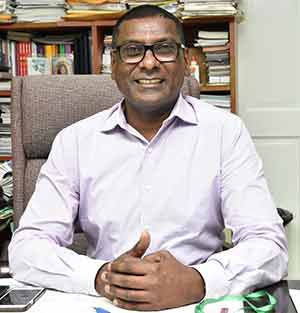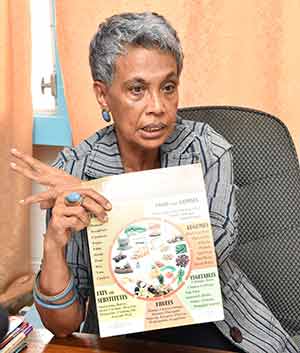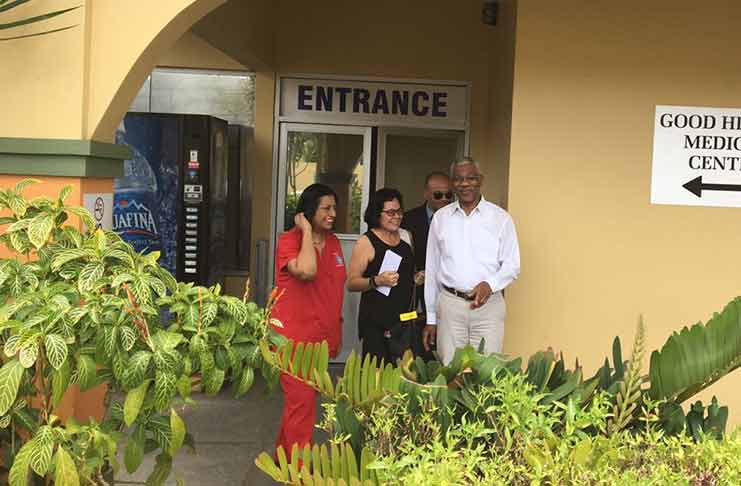A healthy population and strong healthcare systems are key socio-economic indicators, which translate into happy and productive citizens, who have the physical capacity to contribute to the economic, social and cultural development of their communities and country.

Providing adequate health services to the population is a paramount goal for the Government and while public health is the responsibility of the State, it is a matter that cannot be solved by the central government alone. A healthy society must come as part of a combined effort of several stakeholders particularly in the fight against Non –Communicable Diseases (NCDs), which in most cases can be avoided or treated by citizens taking responsibility for their own health.
In this week’s Government in Action, we will take a look at what exactly are Non-Communicable Diseases (NCDs), the risk factors, treatment opportunities available and how personal responsibility can play a significant role in combating these diseases, which remain the number one cause of death in the country.
Tackling Non- Communicable Diseases
Non-Communicable diseases (NCDs) are a growing threat in Guyana and the Caribbean. As a matter of fact, more than half of Guyana’s adult population suffer from one of the four main non-communicable diseases, namely cardiovascular diseases, diabetes, cancers and chronic lung disease.
Statistics provided by the Ministry of Public Health shows that seven out of every 10 premature deaths of Guyanese age 23-60 are caused by one of these NCDs. The major risk factors for non- communicable diseases (NCDs) are tobacco use, physical inactivity, unhealthy diet and the harmful use of alcohol and reducing the numbers affected is the focus of the Government’s work to prevent deaths from NCDs.

This worrying phenomenon resulted in President Granger taking action by setting up the Presidential Commission on NCDs, which was launched on December 16, 2017. He noted that these statistics should make it clear that the prevention and control of non-communicable diseases are essential to ensuring human health and by extension, to bringing up healthier children and happier communities.
“The Government of Guyana recognises the importance of combating NCDs and have established a Commission, and today we witness the establishment of a Presidential Commission but it would be impossible to ensure satisfactory standards of public health unless the highest priority was accorded to the prevention and control of NCDs. That is why I have come here today, to lend my name and my office so that children everywhere, schools, adults, the drinking classes, the smoking classes would know that it is at the level of the President himself that attention will be paid to NCDs and the elimination of NCDs,” the Head of State said.
Chief Medical Officer at the Ministry of Public Health, Dr. Shamdeo Persaud, who sits on this Commission, in an interview with the Public Information and Press Services Unit of the Ministry of the Presidency, said that since its establishment six months ago, the Commission has been meeting regularly to advance awareness, ensure adequate facilities for screening and testing are in place and treatment options readily available.

“We have been working on a plan for the Commission. It’s divided into three sections. We have three subcommittees that are looking [firstly] to develop protocols necessary for medical care. Secondly, to look at health advocacy and prevention program. And then the third area is to look at legislative changes because a lot of what is coming out from the global environment is that things like tobacco, well we’ve already passed the Bill, but we still need to do some more work in terms of reducing tobacco consumption and alcohol,” the Chief Medical Officer said.
Promoting prevention and education
As the popular saying goes, prevention is better than cure. Prevention begins in the home, is reinforced at school and at work and is fortified at the national, regional and neighbourhood levels. Preventable lifestyle diseases, which are often characterised by alcohol and drug abuse, the excessive consumption of processed and fast food, lack of recreation and sport and sedentary habits have contributed to the increased the incidence of non-communicable diseases such as cancers, diabetes, heart disease, hypertension and obesity.
The Head of State has noted that while public health is a right as mandated by the Constitution of Guyana, the responsibility for tackling these diseases rests not only with the State but rather personal responsibility must be taken by every individual and stakeholder.
“This is an emergency; we are in a state of emergency and if you ever had a relative who’s suffering from one of these four diseases and you had to dig into your pocket for every round of treatment you’d know that we are in a state of emergency. This is a national effort. It is not a Governmental effort; it is not a ministerial effort… We must realise that NCDs are not a joke, they’re not fashion, they are a serious threat to life and a leading cause of premature death. NCDs are a pressing problem and unfortunately, the burden falls mainly on the poor. Reducing risk factors, therefore, will not only save lives but will save money,” President Granger said.
Minister of Public Health, Ms Volda Lawrence at the 2018 Health Expo launch at the Sophia Exhibition Centre, said that her Ministry is committed to doing whatever it can to educate and encourage healthy lifestyle choices among the Guyanese population in an effort to combat NCDs. However, she too noted that citizens must begin to take responsibility for their health.
“Guyana can ill afford an unhealthy nation. Guyana is poised for great things but in order for us to be sustainable as a nation, the underlying and key component is wellness. We must change the way in which we embrace and manage our health… We must move from the almost laissez faire attitude to the point where it becomes top priority. The emphasis is because the Ministry wants to work in close collaboration with you to heighten your awareness, educate you on issues, promote lifestyles that will allow us to become the healthiest nation in the Caribbean and the Americas; where our health status can impact significantly on the reduction of NCD risks factors. Let us change our lifestyles and add value to life. Let us reach for a better life with good health,” Minister Lawrence said.
Many NCDs can be prevented by addressing diet, physical activity, tobacco and alcohol use and making the places we live in health promoting. Promoting healthy diet, physical activity, reduced alcohol use and tobacco use termination are simple and cost-effective measures to reduce premature death and disability from NCDs. Prevention strategies are not only effective tools to protect populations against developing an NCD but also for mitigating and reducing the burden of various NCDs. With a rate of 70 percent of the population affected by one of the NCDs, Guyanese must move towards doing more.
Dr. Persaud agrees that all citizens must begin to take a personal responsibility for their healthcare and wellbeing. He noted that the development of these diseases is heavily based on common risk factors, the harmful use of alcohol or tobacco, and unhealthy eating and physical inactivity. Based on a survey conducted by the Ministry last year, approximately 190,000 persons are affected by NCDs in Guyana while NCDs account for 80 percent of the premature deaths in the Caribbean.
“The persons more at risk are generally Guyanese from all walks of life, from all ethnicity, maybe a little more of some race than others. For example, we see higher rates of diabetes among East Indian population and this is associated a lot of times with excess weight whereas the Afro Guyanese population will see a higher rate of hypertensive diseases. That doesn’t mean that either group isn’t affected by one or the other. These chronic diseases are really associated with lifestyle mainly exercise and diet,” the CMO said.
In order to properly combat NCDs, Dr. Persaud said that it is also important that persons educate themselves on the medical history of their families and conduct regular check-ups.
President Granger and First Lady, Mrs. Sandra Granger have been leading the way in ensuring that they undergo regular medical check-ups, exercise daily and eat right. As recent as April, the two underwent a week of medical check-ups, which showed that they are both enjoying good health despite their age.
The Chief Medical Officer noted that both the young and the old population must undertake to be more active. A good place to start he said is exercising at least five days per week for 30 minutes each day.
“You must institute exercise with daily activity to ensure that at least five days per week each of us gets thirty minutes of physical activity. When we say physical activity, we don’t mean just continue doing the work around the home, walking up and down the stairs and so on. We should at least exercise thirty minutes in a way that challenges us, we break a sweat as it were and that we’re able to expend some energy in doing that. We should encourage more sport, you know, friendly matches and mobilise our young men and women to come out and even the others, the older ones too, to get out and move around and be physically active,” Dr. Persaud said.
Diet plays a significant role in combating and reducing the risks of NCDs. Chief Dietary Manager at the Georgetown Public Hospital Corporation (GPHC), Ms. Sandra Johnson in an invited comment with the Public Information and Press Services Unit, said that she stands firmly in the belief that ‘food is medicine’ and every Guyanese should begin to pay closer attention to what they consume.
“Right now in Guyana, more than I’ve ever seen before, food is very important. In the hospital setting, there are a lot of young people suffering from these NCDs, very young people and these conditions have long-term complications when you’re on long-term medication. What patients need to understand, and people generally, is that food can prevent, it can control and it can even cure these NCDs if we eat correctly and exercise.
Exercise is an important factor in it too because if we are going to maintain our body weight, we are going to have all the nutrients that the body requires. As Guyanese, we like to eat too many fast foods and these fast foods, the way they are prepared with a lot of fat and a lot of salt and a lot of sugar, which young Guyanese in particular now, have developed a taste for. We still need the fats, we need the sugar, we need the salts because they all have functions in the body but we need to take it in controlled amounts,” Ms. Johnson said.
Ms. Johnson noted that attention must be paid particularly to the consumption of sugars, salt and fats and oils as these are the elements that increase the risk of Non-communicable diseases. The recommended dosage of salt is four grams per capita. However, in Guyana, the average use is nine grams per capita.
“For those who are not yet diagnosed, they have to eat right and we have a food group which talks about vegetables, carbohydrates, fats. These are the food groups and if you notice, they are in different proportions. One of the things that Guyanese like to do is eat a lot of meat and you see the proportion of meat comparison to the others? It’s not a whole lot of meat that we should be eating; we should include a lot of peas and beans in our foods and vegetables as well as fruits.
Throughout a day, we should have everything in the food groups. We may not be able to eat all in one meal but by the end of the day, whatever we eat should include from all the food groups. Fats and oils are dangerous and it’s in limited amounts. Sugar is dangerous and it’s in limited amounts and salt. We shouldn’t see the fats in the food, we shouldn’t taste the salt, we shouldn’t taste the sugars but they are also needed in the body. If we overdo anything, it’s just as bad as if we under do it so we have to strike that balance,” she noted.
The Ministry of Health has intensified its work to combat the prevalence of NCDs and has been working with the Pan American Health Organisation (PAHO) and World Health Organisation (WHO) to draft policies and implement programmes to stem the growing numbers and to lend support to those already affected. Already the Ministry has pushed for the successful passage of the Tobacco Control Bill and for a ban in public smoking.
Further, the Ministry has been mobilising activities such as health fairs and educational sessions in various communities. This includes community-based programmes which directly target the at-risk population. It is also reaching out to businesses and organisations to allow for screening and awareness sessions to take place.
At the health care level, it offers free screenings and aftercare, treatment options and dietary tips at the various health centres and hospitals across the country.
Additionally, to attract the younger population, sensitisation methods are taking a form through which this group could easily access information, such as social media, text messaging and other media.
Even as Government continues to play its part in ensuring that Non-Communicable Diseases are tackled and a healthier nation is built, citizens must also recognise that they have an equal and corresponding duty to make healthy lifestyle choices and adopt a sense of personal responsibility for their health and wellbeing. Diet and exercise are two places to start.





.jpg)








